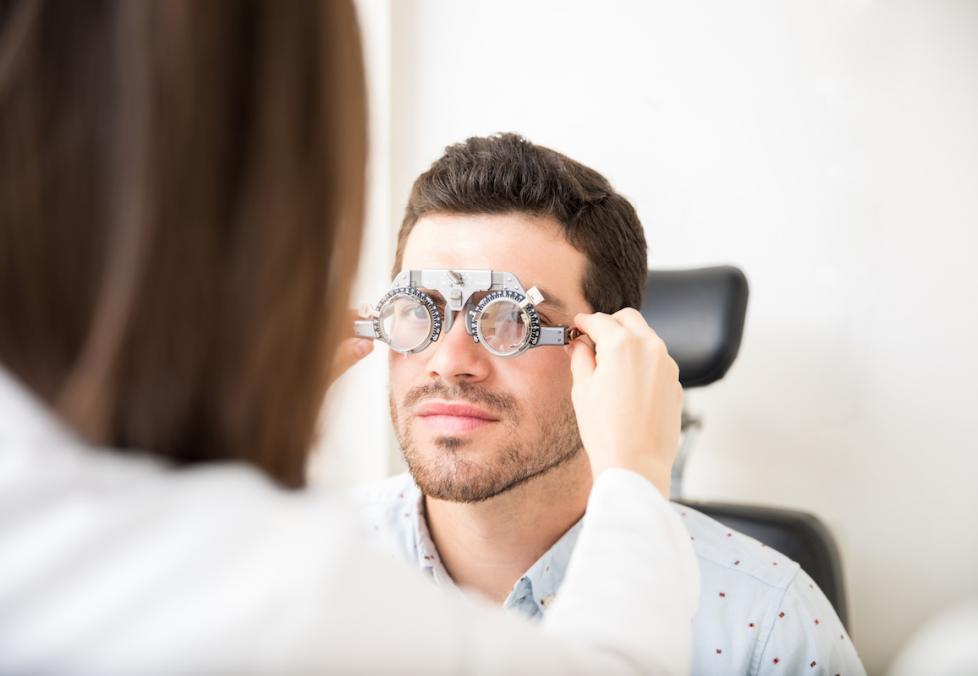
Two pairs and a free, quality eye exam for just $79.95
Everything you need to know to take care of your eyes — for life.
When it comes to eyes, optometrists have seen — and heard — everything. Here, America’s Best answers the most frequently asked vision-related questions.

Optometrists are dedicated to answering all of your eye questions—from the most mundane to the most perplexing.
We asked a handful of America’s Best eye doctors to name—and answer—the seven most common questions they hear. Here’s what they told us.
Have questions about your vision or eye health? Reach out to your America’s Best optometrist, who is an important part of your care team. Click here to make an appointment.
This is one of the most common questions that patients ask their eye doctors, says David Damari, O.D., president of the Association of Schools and Colleges of Optometry.
And the #1 answer: Allergies.
From pollen and dust to animal dander, those pesky little allergens floating in the air can make your eyes itchy and uncomfortable. You can soothe them with eye drops or other allergy medications—but check with your optometrist or primary care doctor first.
Another culprit: Your contact lenses. If you don’t change your contacts frequently enough, your eyes could feel itchy.
“Even long-wearing contacts are only meant to last so many hours,” explains Vijal Shah, O.D., an optometrist at the America’s Best Contacts & Eyeglasses in Alpharetta, Ga. “If you’re putting in very long days, start with lubricating drops—if they are not effective, it’s time to take out your contacts. If you know in advance you are going to be awake for many hours, wear your glasses for a day. Give your eyes a break and let them breathe.”

Two pairs and a free, quality eye exam for just $79.95
Yikes! It can be a scary thing to look in the mirror and see a blood-red eyeball staring back at you.
“It looks dramatically bad,” says Dr. Damari, “but it’s usually not serious.”
It happens when blood vessels burst in the conjunctiva—the clear, thin membrane that covers the outside of your eye and the inside of your eyelid. Most of the time, the blood reabsorbs and goes away on its own.
Combined with other symptoms, it’s possible that it could be a sign of high blood pressure or diabetes. But it’s usually not quite that significant.
“People get really upset about it, but mostly the appearance is much worse than the problem,” says Dr. Damari. “But it usually gets them in to see the eye doctor, and that’s a good thing.”
Ever look closely in the mirror and see strange little flecks on your eye that weren’t there before? Some people think they look like bits of dirt; others say they’re like mini cobwebs of some sort. But what are they, really?
“Most likely, they’re just some changes to the vitreous gel inside your eye,” says Margaret Barrett Harrington, O.D., with America’s Best in Daytona Beach, Fla. “As the gel changes structure, little bits may break off and float around."
These specks, called floaters, are typically nothing to worry about, she says. But if they’re really bothering you, visit your eye doctor.
Maybe, says Dr. Damari. Or maybe not. But it’s good to check with your eye doctor, just to make sure.
Headaches can sometimes be associated with visual tasks, he explains, like reading or doing close handwork. Or you might get a headache when you go out into bright light—which could be a visually triggered migraine.
Or, says Dr. Damari, your headache might be caused by convergence insufficiency, a condition that happens when you have trouble coordinating between your two eyes.
“Some of the symptoms might be drowsiness or discomfort during reading,” he says, “and your headache may seem to be concentrated above your eyebrows or the sides of your eyes.”
Fortunately, this is a condition that’s easily treatable by going to an eye specialist a couple of times a week for a few months. “Almost all patients with this condition respond to vision therapy,” Dr. Damari says.
Your watery eyes are probably caused by dryness, Dr. Harrington says.
It seems counterintuitive, but a common cause of drippy eyes are reflex tears. “They’re trying to moisturize your eyes,” she says, “but the moisture doesn’t stick to your eye because reflex tears are missing some of the sticky components of moisturizing tears.”
The solution: Use artificial tears a few times a day to keep your cornea wet.
Another culprit could be your electronic devices. “When you stare at your computer or smartphone for hours,” explains Dr. Harrington, “your blink rate goes way down, and that dries out your eyes because your tears evaporate faster. Anything that forces you to focus for long periods of time, like concentrating on the road while driving, can dry your eyes and cause them to feel sandy and gritty, which can lead to watery eyes.”
The 20-20-20 rule is a simple fix: Look 20 feet away from your screen for 20 seconds every 20 minutes. And if you’re driving, give yourself ample breaks.
Definitely, says Dr. Harrington. “Lots of patients ask me if an eye exam can tell whether or not they’re diabetic, and I tell them it could be possible.
“If a patient experiences a significant change in vision from one day to the next,” she continues, “that could be an indicator of diabetes. Or if we see bleeding in the back of your eyes, that’s a signal for us to send a patient to their primary care doctor—it could be a sign of diabetes or high blood pressure.”
“Your eye health and your overall health are closely connected,” adds Dr. Damari. “Anything that compromises your general health will also compromise your vision.”
Those little involuntary snaps of your eyelids don’t hurt, but they’re annoying and seem to come out of the blue.
Happily, they’re usually nothing to worry about, says Alicia Pecco, O.D., an optometrist at America’s Best in Wyncote, Pa.
“The most common causes,” she says, “are stress, caffeine, dry eyes, and eye fatigue.”
Dry eyes can be treated with artificial tears, so be sure to have a bottle handy just in case. You can also try a cool compress. And if those twitches are still bothering you, “find ways to reduce stress, cut back on caffeine, and reduce screen time,” says Dr. Pecco.
Eye twitches will generally go away own their own, but if they don’t, see your eye doctor.